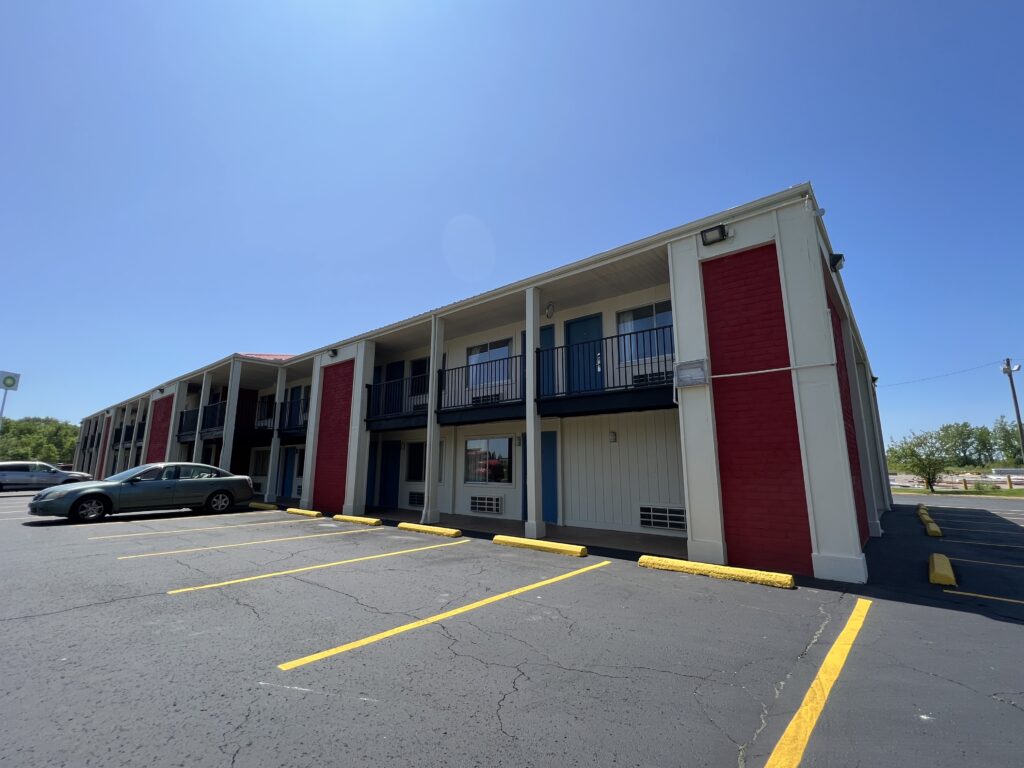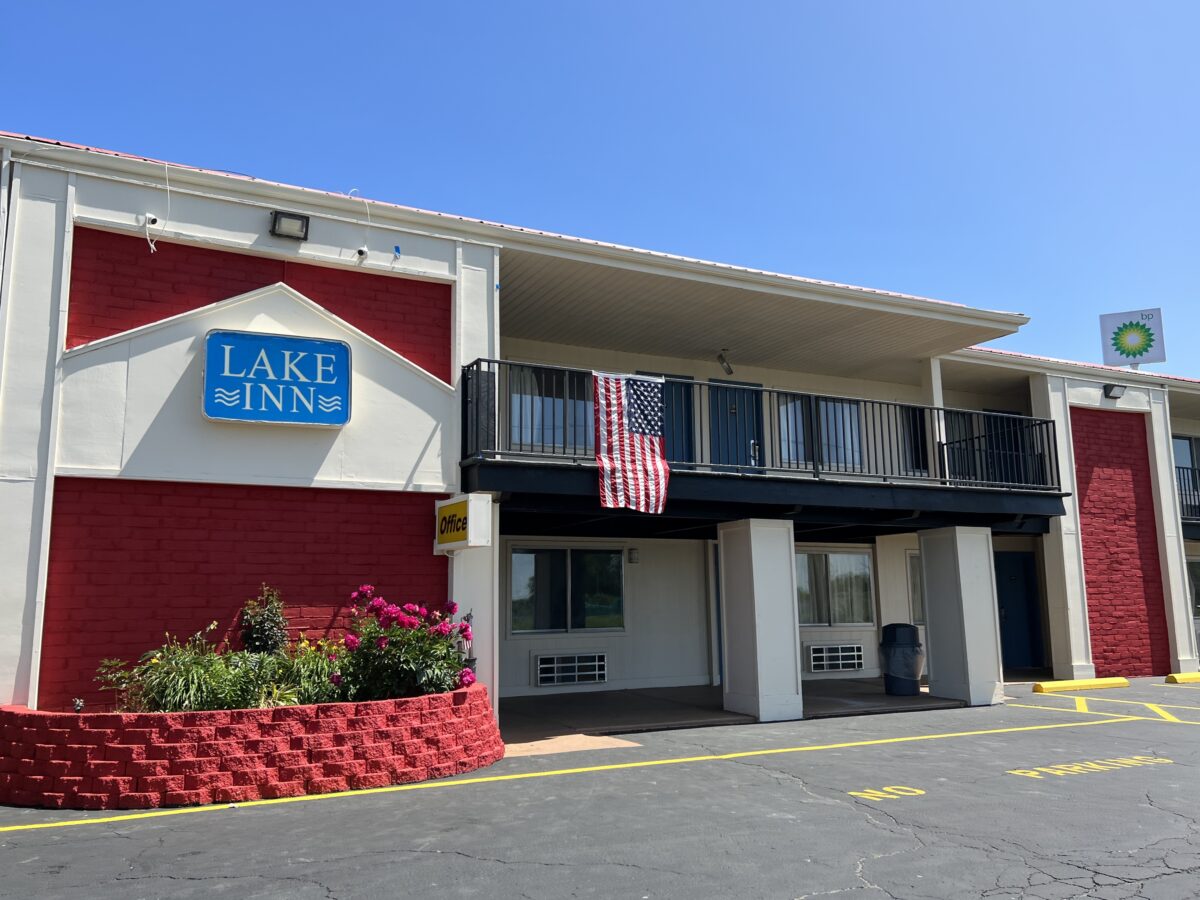The scene that unfolded at a Buckeye Lake motel in April shows how quickly the lack of affordable housing in central Ohio can escalate to a personal disaster for people at the lowest income levels and the people who try to help them.
As the sun set over the Lake Inn on April 3, Buckeye Lake fire and police personnel told an estimated 50 to 60 people living at the motel at the intersection of I-70 and Rt. 79 that they had to pack up and move out.
At 4:30 p.m. that day, Kristin McCloud, executive director at the social service agency Pathways of Central Ohio, said she received a phone call on the 211 Crisis and Information Hotline for Licking County. The caller, a resident of the Lake Inn, reported that a police officer was knocking on doors, informing residents that they had to be out by 7 p.m. that night.

According to Buckeye Lake Police Chief Jason Harget, his officers were there at the request of Buckeye Lake Code Enforcement Officer Rex Adkins, who said motel occupants were told that the emergency evacuation was a result of health and safety issues in the building.
Linda Mossholder, a board member of OhioCAN (Change Addiction Now) and a volunteer with Newark Homeless Outreach, said the motel evacuation was a housing disaster.
“These folks are just barely making enough to pay rent,” said Patricia Perry, Licking County co-founder of Newark Homeless Outreach and a leader of OhioCAN. “At the end of the day, you’re just stuck there because you can’t save up anything.”
Amandeep Kaur of Hebron, who Ohio Secretary of State records identify as the owner of the Lake Inn property, declined to comment when contacted by telephone by The Reporting Project. Kaur is associated with AS Hotels Inc. as an agent of the company, according to OpenCorporates, a database web site of corporate information, and she identified herself as the manager of the motel when speaking on the phone with The Reporting Project.
The motel was open for business last week. A person who answered the phone there said it was taking reservations.
When McCloud got word of the Buckeye Lake situation in April, she said she contacted local advocacy organizations about the immediate need for help.
Among these organizations were The Red Cross and Licking County Emergency Management, both of whom typically serve as first responders to disasters.
But McCloud said this emergency didn’t meet their definitions of “disaster,” so they weren’t able to provide shelter or support.
“It wasn’t something naturally occurring, and so they were unable to help,” said Buckeye Lake Fire Chief Keisha Amspaugh.
The Salvation Army in Newark, which is a go-to refuge for those seeking immediate shelter, didn’t have space.
None of the other organizations McCloud contacted had the resources to take on such a situation. Many of them turned down Lake Inn residents due to bedbug concerns.
“No one was left out in the parking lot that night,” Amspaugh said. “Everyone was able to find some form of shelter.”
So, whether it was waiting at nearby gas stations or spending the night in their cars, those who had been told to vacate the motel had to make due.
“It’s really just heart-wrenching,” said Nancy Welu, a volunteer with Newark Homeless Outreach. “We need to start changing and fast.”
A week after the motel evacuation, representatives of 12 social service agencies met to talk about how the community can safeguard against this happening in the future.
“As our community continues to grow, these situations will continue to pop up,” Welu said, referring to the tight and increasingly expensive housing market here. “We’re not prepared as a county to handle situations of this magnitude.”
A recent report released by The United Way of Licking County showed that in the past two years, the number of working poor people and those living in poverty has increased by 14%.
“People in this situation often get caught up in unhealthy situations, like the one we saw unfold at the Lake Inn,” said Deb Dingus, Executive Director of The United Way of Licking County.
“What happened at the Lake Inn confirms the need for safe and affordable housing at all price points,” Dingus added.
According to Welu, Perry, Dingus and others, Kaur reimbursed residents’ for the motel payments they had made two days prior. However, according to several of the agencies that received calls for help, the checks were dated in such a way that the former residents were unable to cash them until a later date. With limited funds available, residents’ options were slim.
“They had limited resources at their disposal; people were seriously panicking,” Dingus said. “It was last-minute and they were completely caught off guard.”
Many of the motel residents lacked transportation and were hard pressed to find refuge with friends or family.
“Some were able to scramble and find temporary shelter, but a good deal of them were left on the streets,” Welu said.
“As time goes on, people in this situation have nowhere to go,” Perry said.
Sean Grady, Director of Emergency Management in Licking County and co-chair of the Warming Center Task Force in Newark, said, “This is a big problem we need to be aware of.”
“We need a plan in place that protects such a vulnerable population and can respond when necessary,” he said.
The United Way convened a meeting of community leaders on June 13 at the Newark Library to further discuss the issue and to help develop a plan. The goal is to incorporate the resources offered by social service programs to develop a way to ensure safe housing conditions and respond to unexpected situations like the one in Buckeye Lake.
“We all do something different,” Grady said about the organizations involved. “Our mission is to come together, utilize our spectrum of resources and create a united effort that guards against these unfortunate situations.”
Jack Wolf writes for TheReportingProject.org, the nonprofit news organization of the Denison University Journalism Program, which is sponsored in part by the Mellon Foundation.

